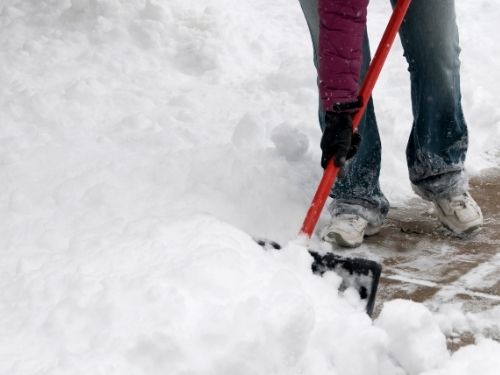Got snow? We bet you do.
Here’s some advice from Europaving specialists that’ll make clearing snow much safer for your paved surfaces. Freezing temperatures and snow can damage your brick pavers, so it’s worth knowing how to care for them.
Large daily temperature fluctuations, water freezing in gaps and a thick, lingering layer of snow or ice – these unfavorable factors can destroy the surfaces around your house. Taking care of your paved surfaces during winter is a big responsibility and it requires your special attention. When clearing snow and removing ice, it’s easy to damage the paved surface, so you should never use any kind of sharp tools. You also shouldn’t use de-icing products too intensively. Although using them from time to time does not affect the quality of the surface, using it every day may cause the surface layer of paving stones to peel off and change their color.
Choosing a Material For Your Home Surroundings
It’s worth taking care of all “amenities” already at the design stage of the house and its surroundings. How the
and sidewalks around the house will survive winter largely depends on the materials that are used to build them. Therefore, when laying pavers, it’s worth paying attention to the type of material used to create these surfaces, because higher-quality materials can withstand adverse weather conditions much better.
It’s best to invest in materials that are characterized by frost resistance, roughness and low water absorption – below 6%. These parameters are especially important in places such as: entrance stairs or frequently used walkways. Protecting the surfaces around the house should be considered before having them laid out – that’s when you can install anti-icing systems. These types of electrical installations increase the safety of the household members, and thanks to their full automation, they are effective and practically self-servicing.
Paving Stone Maintenance During Winter – What Tools to Avoid
 In winter, your paving stones and outdoor tiles are going through a tough durability test. Apart from the extreme winter weather conditions, you can damage the surfaces yourself, if you’re not properly removing snow. Therefore, it’s important to remove snow regularly and not allow it to accumulate. Regular snow removal will protect the surfaces from permanent damage.
In winter, your paving stones and outdoor tiles are going through a tough durability test. Apart from the extreme winter weather conditions, you can damage the surfaces yourself, if you’re not properly removing snow. Therefore, it’s important to remove snow regularly and not allow it to accumulate. Regular snow removal will protect the surfaces from permanent damage.
However, removing snow from a paver surface must take into account the specificity of the material, and paving stones have their own requirements in this respect. Traditional snow removal methods rely on mechanical equipment, so if you have a diesel or electric snow blower, the problem is basically solved.
Mechanical snow blowers support human work without the risk of disturbing the ground. Most of us, however, use simple tools and the strength of our own hands when clearing snow from your driveways.
Choosing the right tools and using them effectively is the key to a successful snow removal operation. Give up your heavy metal shovels and sharp-edged ice-breaking tools that can easily break the top layer, weakening it and reducing its strength. Home improvement stores offer a wide selection of shovels and manual plows, which are finished with a reinforced aluminum slat, but are made of plastic that protects against snow sticking to it and. If you have a garden tractor with a plow function and the size of your paved surface forces you to use it, make sure that the plowing element has a rubber end and that it does not excessively scrub the ground during snow removal.
To clear small areas on your walkways, you can use a blower, which is usually used to remove dry leaves and debris from a lawn, patio and other outdoor surfaces. The device will sweep away fresh fluff, but unfortunately it will not remove wet, heavy snow. Therefore, you should work with it systematically, blowing snow off as soon as it falls.
De-icing Products
How to deal with excess snow without removing it? Road salt, or de-icing salt is most frequently used for sprinkling surfaces. However, as it turns out, this can be the cause of unsightly discoloration of paving stones, which you will not fully see until the surfaces dry out completely in March. Moreover, salt negatively affects the soil and plants that are located along the driveways and pathways – salt makes it difficult for plants to absorb water and inhibits their growth.
If you want to get rid of the residual snow, and you do not want to remove it by hand, it’s better to use magnesium chloride instead of salt, which will not lead to stains and efflorescence. The best solution, however, is to sprinkle sand on snow-covered driveways and sidewalks. Sand is a good alternative – it doesn’t melt ice but it provides traction for vehicles or foot traffic. It’s also completely harmless to the concrete surface.
Winter Paver Maintenance – Common Mistakes
Using metal shovels and other equipment for removing snow can lead to scratches and chipping. It’s a better idea to replace any metal tools with plastic ones.
For snow removal, use snow-dissolving products available on the market, which don’t damage your brick pavers and are safe for your plants.
It’s also worth considering laying automatic mats or heating cables under the paved surface. Outdoor electric heat is the only chemical-free option to clear snow from driveways and walkways. This way you will not only NOT have to remove snow every winter, but it will also guarantee safety for you and your family members, even when the entire area is covered with a thick layer of snow.




 Paving Contractors near Chicago, IL
Paving Contractors near Chicago, IL